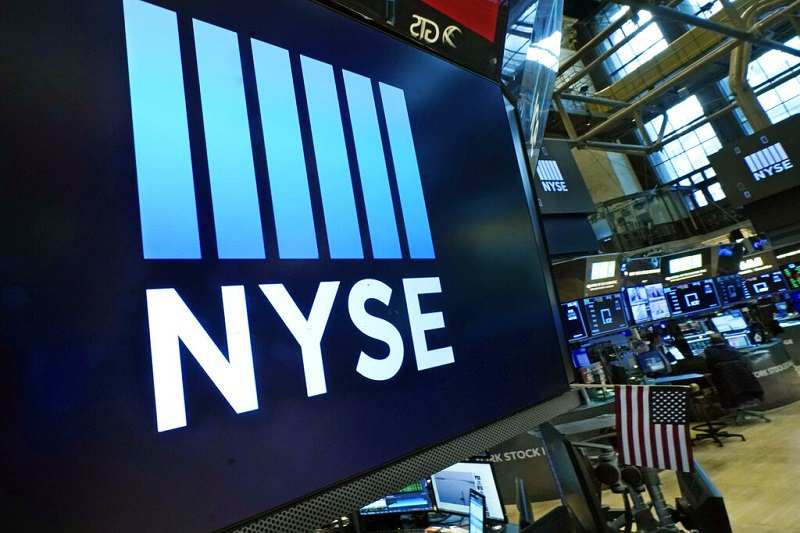
The New York Stock Exchange logo adorn trading posts, on the floor, Wednesday, March 16, 2022.
11:21 JST, May 6, 2022
NEW YORK (AP) — A sharp sell-off left the Dow Jones Industrial Average more than 1,000 points lower Thursday, wiping out the gains from Wall Street’s biggest rally in two years, as worries grow that the higher interest rates the Federal Reserve is using in its fight against inflation will derail the economy.
The benchmark S&P 500 fell 3.6%, marking its biggest loss in nearly two years, a day after it posted its biggest gain since May 2020. The Nasdaq slumped 5%, its worst drop since June 2020. The losses by the Dow and the other indexes offset the gains from a day earlier.
“Yesterday’s sharp rally was not rooted in reality and today’s dramatic selloff is a reversal of that misplaced exuberance,” said Ben Kirby, co-head of investments at Thornburg Investment Management.
Wall Street’s breakneck day-to-day reversal reflects the degree of investors’ uncertainty and unease over the array of threats the economy is facing, starting with inflation running at the highest level in four decades, and how effective the Federal Reserve’s bid to tame higher prices by jacking up interest rates will be.
On Wednesday, the Federal Reserve announced a widely expected half-percentage point increase in its short-term interest rate. Stocks bounced around following the move but then sharply rose as bond yields fell after Fed Chair Jerome Powell reassured investors by saying the central bank wasn’t considering shifting to more aggressive, three-quarters point rate hikes as the Fed continues with further rate increases in coming months.
But whatever relief Powell’s remarks gave stock investors vanished Thursday. Stocks slumped and bond yields climbed. The yield on the 10-year Treasury note rose to 3.04%. Rising yields are sure to put upward pressure on mortgage rates, which are already at their highest level since 2009.
Investors remain uneasy about about whether the Fed can do enough to tame inflation without tipping the economy, which is already showing signs of slowing, into a recession. In addition to high inflation and rising interest rates, investors are grappling with uncertainty over lingering supply chain disruptions and geopolitical tensions.
“The biggest issue is there are just a lot of moving parts and the unanswered question is to what extent as the Fed attempts to tame inflation will that result in economic slowing, and perhaps, a recession,” said Terry Sandven, chief equity strategist at U.S. Bank Wealth Management.
The S&P 500 fell 153.30 points to 4,146.87, while the Nasdaq slid 647.16 points to 12,317.69. The Dow briefly skidded 1,375 points before closing down 1,063.09 points, or 3.1%, to 32,997.97.
Smaller company stocks also fell sharply. The Russell 2000 fell 78.77 points, or 4%, to 1,871.15.
The Fed’s aggressive shift to raise interest rates has investors worrying about whether it can pull off the delicate dance to slow the economy enough to halt high inflation but not so much as to cause a downturn.
On Wednesday, Powell said there was a “good chance” that the economy will have a “soft or softish landing or outcome” as the central bank raises rates.
But Wall Street isn’t necessarily convinced.
“Concerns focus on whether the Fed will have to become even more hawkish to bring demand down — and that would involve slowing the economy more than they now project,” said Quincy Krosby, chief equity strategist for LPL Financial. “And today’s market action is questioning whether ‘soft-ish’ is plausible.”
The latest move by the Fed to raise interest rates by a half-percentage point had been widely expected. Markets steadied this week ahead of the policy update, but Wall Street was concerned the Fed might elect to raise rates by three-quarters of a percentage point at its next meeting. Powell eased those concerns, saying the central bank is “not actively considering” such an increase.
The central bank also announced that it will start reducing its huge $9 trillion balance sheet, which consists mainly of Treasury and mortgage bonds, starting June 1. Those large holdings are a policy tool the Fed uses to keep long-term interest rates, like those on mortgages, low.
When Powell said the Fed wasn’t considering a mammoth increase in short-term rates, that sent a signal to investors to send stock prices soaring and bond yields tumbling. A slower pace of interest-rate hikes would mean less risk of the economy tipping into recession, as well as less downward pressure on prices for all kinds of investments.
But diminishing the odds of a three-quarters point hike doesn’t mean the Fed is done raising rates steadily and sharply as it fights to tame inflation, not even close. Economists at BNP Paribas still expect the Fed to keep hiking the federal funds rate until it reaches a range of 3% to 3.25%, up from zero to 0.25% earlier this year.
“We do not think this was Chair Powell’s intention,” economists at BNP Paribas wrote in a report, citing the market’s jubilance on Wednesday, “and we reckon we could see coming ‘Fedspeak’ seek to re-tighten financial conditions.”
The Bank of England on Thursday raised its benchmark interest rate to the highest level in 13 years, its fourth rate hike since December as U.K. inflation runs at 30-year highs.
Energy markets remain volatile as the conflict in Ukraine continues and demand remains high amid tight supplies of oil. European governments are trying to replace energy supplies from Russia and are considering an embargo. OPEC and allied oil-producing countries decided Thursday to gradually increase the flows of crude they send to the world.
Higher oil and gas prices have been contributing to the uncertainties weighing on investors as they try to assess how inflation will ultimately impact businesses, consumer activity and overall economic growth.
Homebuilders fell broadly Thursday as average long-term home loan rates climbed. D.R. Horton slid 5.8%.
The average rate on a 30-year fixed-rate mortgage rose to 5.27% this week, its highest level since 2009, according to mortgage buyer Freddie Mac. A year ago, it averaged 2.96%. Mortgage rates tend to follow moves in the 10-year Treasury yield. The sharp increase in mortgage rates has strained affordability for homebuyers after years of sharply rising prices.
Top Articles in News Services
-

Prudential Life Expected to Face Inspection over Fraud
-

Hong Kong Ex-Publisher Jimmy Lai’s Sentence Raises International Outcry as China Defends It
-

Japan’s Nikkei Stock Average Touches 58,000 as Yen, Jgbs Rally on Election Fallout (UPDATE 1)
-

Trump Names Former Federal Reserve Governor Warsh as the Next Fed Chair, Replacing Powell
-

Suzuki Overtakes Nissan as Japan’s Third‑Largest Automaker in 2025
JN ACCESS RANKING
-

Japan Institute to Use Domestic Commercial Optical Lattice Clock to Set Japan Standard Time
-

Israeli Ambassador to Japan Speaks about Japan’s Role in the Reconstruction of Gaza
-

Man Infected with Measles May Have Come in Contact with Many People in Tokyo, Went to Store, Restaurant Around When Symptoms Emerged
-

Prudential Life Insurance Plans to Fully Compensate for Damages Caused by Fraudulent Actions Without Waiting for Third-Party Committee Review
-

Woman with Measles Visited Hospital in Tokyo Multiple Times Before Being Diagnosed with Disease























